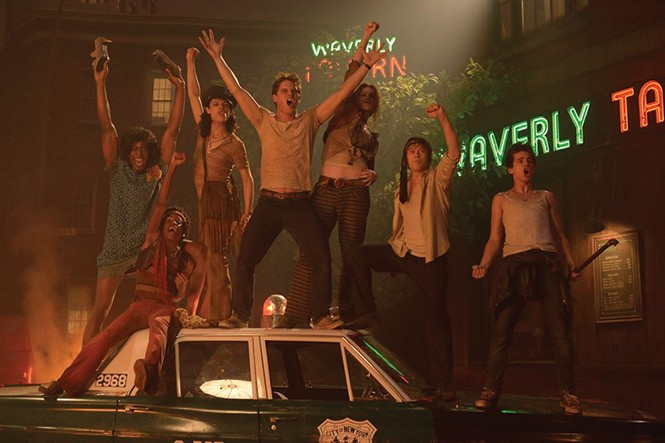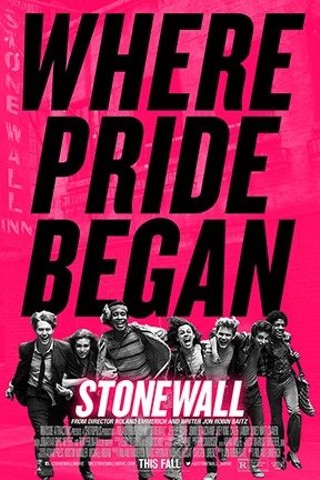Stonewall
Stonewall portrays a pivotal historical moment through formulaic tedium
By Scott Renshaw @scottrenshawFrom the outset, it seemed like a joke: Roland Emmerich? Doing a movie about the 1969 Stonewall riots? Really?
I mean, this was the filmmaker whose most defining work has been apocalyptic action-disaster epics like Independence Day, Godzilla, The Day After Tomorrow and 2012. Sure, he had dabbled in historical fiction-based stories like The Patriot and Anonymous, but even then, his work was big and blustering, pulling audiences along at a pace that demonstrated little concern for niceties of characterization. Was this the guy who could do justice to the single most pivotal moment in the American gay-rights movement?
It's easy to understand why anyone concerned about the cinematic telling of this story might have knives out before the lights even go down, despite a screenplay written by talented gay playwright Jon Robin Baitz. And Emmerich doesn't do much to assuage fears at the outset, launching right into black-&-white dramatizations of the June 28, 1969, start of the riot, serving as background for on-screen captions about the conditions gay Americans faced at that time: prohibition from employment in the federal government; laws making it illegal to serve alcohol to homosexuals; electroshock therapy as a standard form of "treatment." Only two minutes into Stonewall, and it already doesn't feel like a movie. It feels like a lecture.
Emmerich soon flashes back three months and dives into the narrative proper, focused on a high-school senior and prospective Columbia University freshman named Danny (Jeremy Irvine) who has fled his Indiana home for New York City's Christopher Street—the center of America's gay universe—after being discovered in flagrante delicto with another boy. He soon connects with a group of essentially homeless young street hustlers, including Ray (Jonny Beauchamp), and tries to navigate a world of nightclubs run by organized crime and cops looking to raid any place where gays congregate.
At least initially, Irvine does a solid job conveying Danny's sense of having no idea where he belongs, from his go-along chuckle as his high-school class is shown an "instructional film" about predatory homosexuals, to his amazement when seeing two men openly holding hands on Christopher Street. It's a fairly obvious dramatic structure for such a story—introducing a clueless audience proxy who can receive all the expository dialogue meant for us—but it's at least modestly effective at setting the scene of daily life for an LGBT American circa summer of '69.
The problem with Stonewall is that "fairly obvious dramatic structure" comes to define everything about it—and that's the good news. Danny's story turns into a kind of romantic triangle, as he becomes fascinated with a middle-class political activist named Trevor (Jonathan Rhys Meyers), even as Ray starts falling for Danny's Middle American innocence. And those two conveniently become stand-ins for opposing points of view on how to pursue gay rights—Trevor as the patiently-working-within-the-system guy, and Ray as the rabble-rouser. Everything starts to feel like it was cobbled together from spare parts of every possible movie cliché: Danny's stern father (who, naturally, is also the macho football coach); the police brutality that's full of sneering gay slurs; the softly lit seduction scene. By the time we get to the guy for whom Danny has been kidnapped to provide sexual favors—a closeted man in a dress and lipstick, playing opera music on the stereo as he drops hints that he may be a murderer—Emmerich's attempt to create a scene ostensibly meant to be menacing instead turns unintentionally hilarious.
Emmerich might have salvaged Stonewall if he could have staged the centerpiece uprising with any sense of urgency. But despite all the thrown bottles and clashes with riot-gear-clad cops, he seems to approach those scenes the same way he has created life-or-death moments in his disaster movies—as a carefully choreographed climax, with telegraphed beats (including tension-breaking jokes, albeit poor ones), rather than the genuine rage that launched a civil-rights movement.
Those who know the real-life story or milieu better might have different kinds of frustrations, but Stonewall also fails as basic filmmaking. This can't be the kind of equality that those Stonewall activists were fighting for: the right to have their story turned into formulaic historical fiction as tedious as the kind about straight people.
Rated R · 129 minutes · 2015
Director: Roland Emmerich
Producer: Roland Emmerich, Marc Frydman, Michael Fossat, Carsten Lorenz, Adam Press, Kirstin Winkler and Michael Roban
Cast: Jeremy Irvine, Jonny Beauchamp, Joey King, Caleb Jones, Matt Craven, David Cubitt, Vladimir Alexis, Ben Sullivan, Andrea Frankle, Alex Nachi, Karl Glusman, Otoja Abit, Jonathan Rhys Meyers and Ron Perlman
What others are saying
More by Scott Renshaw
-
Film Reviews: New Releases for April 19
The Ministry of Ungentlemanly Warfare, Abigail, The Beast, Hard Miles, Sasquatch Sunset and more
- Apr 19, 2024
-
Faces of Salt Lake County book and portrait reception
Images and personal stories in a new book reveal local demographic diversity
- Apr 17, 2024
-
Feature film review: THE BEAST
A filmmaker's compelling ideas get a bit tangled in references to his creative influences.
- Apr 17, 2024
- More »





